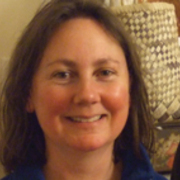
Andrea Bosshard
Andrea Bosshard has made and written films, as well as critiquing them for magazine Illusions. In recent years — alongside partner Shane Loader — she has crossed into feature films, as part of a plan to create contemporary stories for a broad local audience.
Bosshard grew up in the coastal Canterbury town of Akaroa. Thanks to her parents, who ran the local film society, she was able to watch many international film classics while growing up. She moved to Dunedin in time for high school; in the sixth form, a drama teacher gave her a Super 8 (a type of 8mm film) camera and some film stock, and told her to go make something. Bosshard has followed her teacher’s advice tenfold.
Bosshard studied film and political science at Victoria University, and began writing articles for, and later designing, Illusions magazine. She spent 1992 in Australia, studying film at Melbourne's Swinburne School of Film and Television.
In the mid 1980s Bosshard and Loader, who are real life partners, began collaborating on films, including a number of experimental Super 8 works. Sometimes they shared directorial credits, sometimes not (these days when they are on set together, Bosshard tends to concentrate on performances, while Loader decides how the scene will be constructed). In 1988 the duo joined with future Māori Television executive Haunui Royal to make the 70-minute In Our Own Time - Unemployed Respond to Unemployment. The documentary was made for national unemployed worker organisation Te Roopu Rawakore o Aotearoa.
The same year, Bosshard and Loader were invited to join the team of documentary filmmakers at Wellington's Vanguard Films. Their Vanguard work includes abortion documentary Backroom Troubles, which reveals how Kiwi women handled unwanted pregnancies in the days before abortion's legalisation.
Bosshard has also written and directed a number of short dramas, including intergenerational family tale Walking Past Midnight (1993), which won awards in Australia for its script and cinematography, and the quirky, black and white-shot The Intruder (2000).
In 2006 Bosshard and Loader began researching how feature films might be made in a different way. Two years later they launched Torchlight Films, announcing a low-budget filmmaking model in which scripts are developed in collaboration with actors, then later distributed by the Torchlight team. They were inspired by both the Danish-born Dogme movement, and Brit director Mike Leigh's improvisational methods for developing character and narrative.
The aim is to develop a filmmaking model that allows “prolific, vigorous, independent” films to be made on low-budgets, for broad local audiences. The stories being told are "sourced from our communities — stories that are contemporary, multi-cultural, cross-generational and which address the issues which affect us all’.
The first Torchlight feature film was 2008‘s Taking the Waewae Express, whose plotline springs from the death of a teenager in a car accident. Listener critic Helene Wong called the film “a beautifully understated but emotionally strong look at the effect of death on a group of young friends”. She argued that “it shows bracingly what can be achieved using improvisation — a la Mike Leigh — to develop story and character.” Herald veteran Peter Calder praised the “smart script which eschews both cheap dramatics and easy payoffs”.
Torchlight followed it with Hook, Line and Sinker in 2011, starring Waewae’s Rangimoana Taylor as a longtime truck-driver whose life threatens to go off the rails, after an eye test provides unwelcome news. The cast also features Geraldine Brophy (Second-Hand Wedding) and Carmel McGlone (The Marching Girls). Dominion Post critic Graeme Tuckett praised the film’s performances and “beautifully pitched script”, calling the result “likeable, admirable and hugely enjoyable”.
The pair's third feature The Great Maiden's Blush was shot by celebrated cinematographers Alun Bollinger and Waka Attewell. This time the story was built around two people from very different backgrounds: a girl-racer in prison for manslaughter (Hope and Wire's Miriama McDowell), who plans to adopt out her baby, and a failed classical pianist (Renee Lyons) whose own baby is due to have a risky operation. "The directors make the most of the limitations," wrote Listener reviewer James Robins, "proving that care and dedication are worth far more than any blank cheque". Maiden's Blush was judged Best Self-Funded Film at the 2017 NZ Film Awards; McDowell took away Best Actress.
In 2017 Bosshard and Loader made their first feature-length documentary. Kobi profiles Bosshard's father, Swiss-Kiwi jeweller Kobi Bosshard. It debuted at the Wellington edition of the NZ International Film Festival.
Bosshard and Loader chose to distribute all their features themselves, feeling the established model of releasing films left the distributor taking too high a cut of box office returns. Before digital projection became the norm in Kiwi cinemas, the cost of transferring a digitally-shot feature onto a 35mm format that could screen in cinemas was often prohibitive for low-budget filmmakers. Bosshard and Loader argue that even in the time between Waewae Express and Hook, Line and Sinker, the rapid spread of digital cinemas — plus advances in digital technology — provided many more screening opportunities for their work.
Bosshard taught acting for the screen at Wellington's Performing Arts Centre for more than eight years — plus a film production course at Victoria University.
Profile updated on 8 November 2021
Sources include
Andrea Bosshard
Shane Loader
Torchlight Films website. Accessed 23 March 2017
James Robins, 'The Great Maiden's Blush - review' - The Listener, 23 May 2016 (broken link)
Helene Wong, ‘Hook, Line & Sing directed by Andrea Bosshard & Shane Loader’ (Review) - The Listener, 25 April 2011, Issue 3703 (broken link)